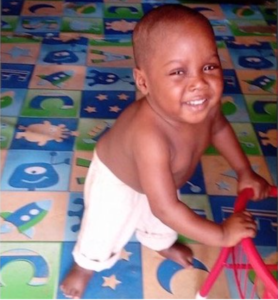
The remarkable recovery of Hope abandoned in 2016 after being accused of witchcraft in Nigeria made headlines. Photo: Nsidibe Orok/ Anja Ringgren Lovén Facebook
By Kylie Kiunguyu on April 19, 2018
There is an ongoing culture of killing twins and other infants in Nigeria’s Federal Capital Territory (FCT) area councils. Christian missionary Steven Olusola Ajayi and his wife Chinwe opened the Vine Heritage Home to shelter children deemed “evil” by their communities.
Bwari, Kuje, Gwagwalada and Kwali are some of the area councils in the Federal Capital Territory (FCT) where communities use infanticide to “rid” themselves of twins and other multiple-birth babies, albinos, babies whose mothers die within three months of the baby’s birth, babies who grow upper teeth first or babies born with defects. To the people of the community, these are signs that the babies are evil and will cause harm to its parents or the community at large.
The penalty for this evil is death by poisoning with a deadly mixture of plants and herbs, starvation, neglect, suffocation, crushing or being buried alive, especially in instances where the mother passed away before the baby is weaned – the baby will be buried alive with her body.
Infanticide was once common in parts of Nigeria, but work by missionaries in the late 19th century meant it became less so. Yet it continues to occur in secret in a host of communities. Campaigners and the government are trying to tackle the superstitions behind these killings and also to address the denials and secrecy that surrounds them in an attempt to protect vulnerable children.
Vine Heritage Home
Christian missionaries Steven Olusola and Chinwe Ajayi opened the Vine Heritage Home in 2004, a shelter for so-called “evil” children. For more than 20 years, Ajayi has been working with 40-plus communities on the traditions of ritual infanticide in the Abuja area.
In a sign that his 20-year-long grass-roots effort is having an effect, some communities are now willing to give away the “evil” children, rather than kill them. Ajayi says this is progress. “They don’t kill them, but they don’t want them,” he told Afrocentric Confessions.
Ajayi told Reuters that he and his wife do not put the children up for adoption but look after them until it is safe to “return them to their families”.
It has been difficult working against the culture but it is slowly bearing fruit, despite push back from some communities and their spiritual leaders. Their attitudes are reflected in their reasoning for the infanticide: Alkali Magaji, the spiritual leader of Kaida, told Afrocentric Confessions, “Our people believe that these children come from the evil one and no one wants it. We have a god we call Otauchi and we offer the children to that god. We suspect those children to be witches or wizards. That’s why we eliminate them.” The practice is so deeply interwoven with the local spiritual beliefs that complete eradication will be difficult.
Some places have progressed, however, such as Kutara village, where seven pairs of twins are living within the community. Ajayi said it’s one of the first villages to end baby killings. The local chief, Bature Dangana, told VOA that he is happy to see twins living among them.
Government Intervention
The Nigerian government began investigating infanticide in 2013, starting off a campaign to eradicate the practice. The campaign includes building primary health care centres and primary schools. Dr Matthew Ashikeni, the executive secretary of the FCT Primary Health Care Board, was part of the investigation panel.
“There was a need for enlightenment and education, so that the communities would know … medical science has the capacity to correct most, if not all, such defects. Billboards were erected in strategic places in those area councils, informing them that that was a stone-age practice and should not be done now when we have opportunity and exposure to science and education,” Dr Ashikeni told VOA.
Director Garba Abari of the National Orientation Agency (NOA), a government body that communicates policy, told Reuters that the campaign, dubbed ‘Eliminating Negative Cultural Practices’, operates mainly in Abuja although children are killed elsewhere in Nigeria. Abari said this was due to the fact that authorities had failed to find civil society groups to work with them to combat infanticide as there was a great deal of denial in communities and suspicion of outsiders.
The NOA therefore went on to employ local people to work on the issue, an approach that seems to be working as the government has received no reports of infanticide in Abuja in more than a year.
“You don’t just go and confront them, saying that you are coming to talk to them to stop it … The best thing is to use the traditional leaders and heads of communities,” he said.
However, the decline could be attributed to the practice going further underground, with communities now committing it in deep secrecy.
No matter what the numbers are, people like Steven and Chinwe are desperately needed to fight this outdated belief and provide a safe haven for children under threat.
Source: This Is Africa – Opinion

